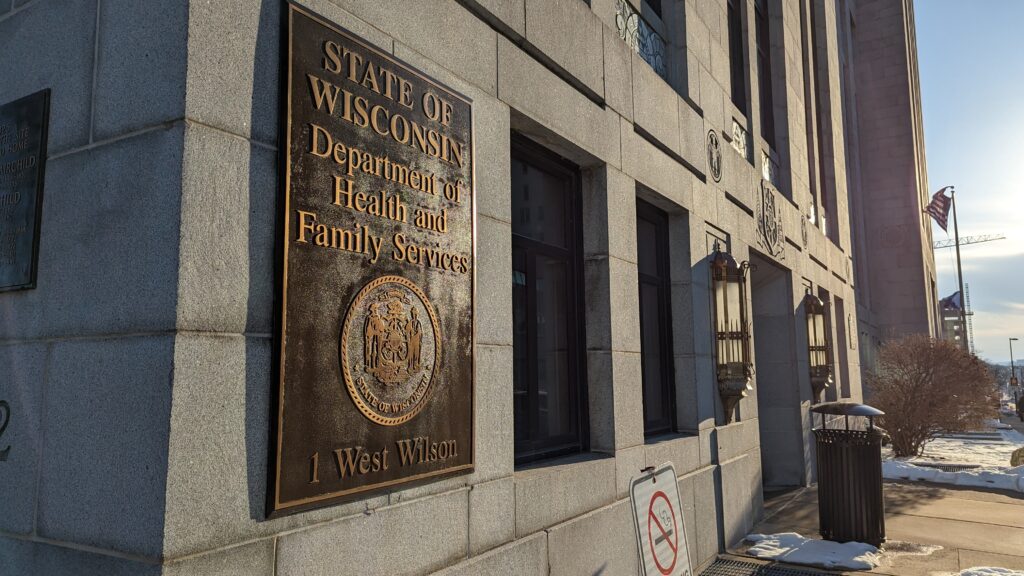Many in Wisconsin Losing Medicaid Coverage
39,000 recipients found ineligible in June, first month of transition from pandemic rules.

The Wisconsin state office building housing the Department of Health Services (DHS), previously the Department of Health and Family Services before the agency was split into separate departments. Photo by Baylor Spears/Wisconsin Examiner.
A little more than one-third of the first group of Wisconsin residents who sought to renew their Medicaid coverage in June were disqualified from the program, according to data released Thursday by the state health department.
The Department of Health Services (DHS) emphasized that the initial information is incomplete as Wisconsin, along with the rest of the U.S., requires participants to formally qualify for Medicaid each year for the first time in more than three years.
Federal law requires states to determine annually whether a Medicaid recipient qualifies for coverage — a test that, with some exceptions, is based on individual or family income. In Wisconsin, the income ceiling for most people is based on the federal poverty guideline.
Starting in March 2020, however, Congress suspended the annual renewal requirement so recipients didn’t lose health coverage during the COVID-19 pandemic. A federal law enacted late in 2022 ended the suspension this April, setting the stage for what state and federal officials have called “the Medicaid unwinding.”
On Thursday, DHS published a website to report the state’s Medicaid renewal data.
During the three-year suspension period, the number of people in Wisconsin on Medicaid rose to about 1.6 million. That is about 1 in 4 Wisconsin residents, according to DHS, and about 25% more than the state’s usual enrollment.
The vast majority, nearly 1.2 million people, are enrolled in the state’s BadgerCare Plus program, which provides health and hospital coverage for families, adults and children. Medicaid provides health coverage for nearly half of all Wisconsin children.
Wisconsin’s Medicaid unwinding renewal process is being spread out over 12 months, from June 2023 through May 2024.
In June, 99,037 people were due to renew their enrollment. According to DHS, 61,057 started that process — about 60%.
The DHS renewal data website doesn’t report how many renewal applicants have been accepted or rejected.
DHS reported Thursday that 37% of the renewal applicants in June — 22,639 people — were found ineligible. Another 29,306 renewal applicants, 48%, kept their coverage. The renewal applications for the remaining applicants are still being processed.
The nearly 39,000 Wisconsin Medicaid recipients who were due to renew in June and haven’t started the process will lose their coverage. They have three months past their renewal month to follow up with the process and get reinstated if they qualify, however, according to DHS.
“There’s no data that can tell us exactly why an individual may not renew,” said State Medicaid Director Jamie Kuhn. “Some may have other coverage. Some may know their income increased,” making them no longer eligible. “Some may have other life events that prevent them from renewing or family emergencies. And because we don’t know, it is imperative that we talk about the data and not just speculate to fill in the blanks.”
Kuhn said DHS has continued to ask organizations, health care providers and others who serve Medicaid patients to reach out and encourage them to start the renewal process.
“We want people who are eligible [for Medicaid] to participate and stay covered,” Kuhn said. “We all know having health care coverage is associated with better outcomes, lower medical costs and reduced financial strain on Wisconsin families. We are committed to helping our members through this process so they can keep their health care coverage if they are eligible.”
Patient advocate Brynne McBride told the Wisconsin Examiner that the information DHS released Thursday is “preliminary and incomplete” but important to follow as the unwinding process continues.
“The data is certainly better than many other states, but is not great,” said McBride, chief operating officer of ABC for Health, a nonprofit that advocates for low-income individuals and families seeking health coverage. “It’s early. We’ll keep our eye on it. We can learn from other states, and Wisconsin should certainly continue to track this closely.”
In counseling patients who are disenrolled, “part of our effort moving forward will be to evaluate if Medicaid is still appropriate for a terminated family, connect them to new coverage options if not, but also take advantage of the ‘late renewal’ window several people might currently be in to renew and backdate their coverage,” McBride said. “All of this is complicated, confusing, and time consuming.”
The information DHS has released so far hasn’t identified how many people in Wisconsin have been cut off from Medicaid for procedural reasons — such as failing to respond in time to a renewal form. In some states, such as New Mexico, tens of thousands of people have lost coverage after not acting to renew their enrollment.
According to the Medicaid unwinding tracker maintained by the health policy research and information nonprofit KFF, as many as 74% of Medicaid disenrollments nationwide reported so far have been for procedural reasons.
Wisconsin is not included in the tracker, which currently has data from 33 states and the District of Columbia.
In a national briefing Wednesday by the federal Centers for Medicare & Medicaid Services (CMS), Deputy Administrator Dan Tsai told reporters that the agency identified some states with problems in their renewal process that didn’t follow federal requirements. CMS has not publicly identified those states.
CMS ordered about a half-dozen states to temporarily stop cutting people off Medicaid on procedural grounds and to reinstate people who had been already terminated until those states fix the problems in their procedures, he said.
With annual enrollment resuming, Wisconsin reports early Medicaid renewal numbers was originally published by the Wisconsin Examiner.


















